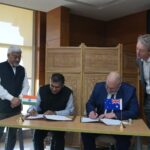
New Delhi:
In a major step towards strengthening agricultural and trade ties, India and Australia signed a Mutual Recognition Arrangement (MRA) for organic products on 24 September 2025 at Vanijya Bhavan, New Delhi. The signing ceremony was attended by senior officials, including Commerce Secretary Shri Sunil Barthwal, APEDA Chairman Shri Abhishek Dev, and Mr. Tom Black, First Assistant Secretary, Department of Agriculture, Fisheries and Forestry (DAFF), Australian Government.
The MRA is jointly implemented by India’s Agricultural and Processed Food Products Export Development Authority (APEDA) under the Ministry of Commerce & Industry, and Australia’s Department of Agriculture, Fisheries and Forestry (DAFF).
The arrangement covers three categories of organic products:
- Unprocessed plant products (excluding seaweed, aquatic plants, and greenhouse crops),
- Processed foods made from plant-origin ingredients, including certified organic imports processed in either India or Australia,
- Wine.
By recognizing each other’s organic certification systems, the MRA will reduce duplication of inspections, simplify compliance, and open new opportunities for exporters and farmers. It reflects the mutual trust in the integrity of organic standards maintained by both nations.
Shri Sunil Barthwal emphasized the role of the National Programme for Organic Production (NPOP) in ensuring credibility and transparency in India’s organic sector. He underlined that organic produce should not be seen as mere certification, but as part of a holistic system ensuring quality, farmer welfare, and consumer trust. With organic products fetching 30–40% higher prices, farmers benefit from stronger incomes.
He also called for strict labelling norms, penalties for violations, and capacity building measures to ensure that organic integrity is preserved across the supply chain.
Mr. Tom Black, representing the Australian Government, commended India’s fast-growing organic sector and highlighted Australia’s leading position with 53 million hectares of organic farmland. He noted opportunities for collaboration in cereals, spices, beverages, tea, and wine.
India’s organic exports to Australia stood at USD 8.96 million in FY 2024–25, with 2,781.58 metric tonnes exported, led by psyllium husk, coconut milk, and rice. The new arrangement is expected to accelerate organic trade, enhance market access, and contribute to India’s vision of becoming the “Organic Food Basket of the World.”
The MRA is not just a trade boost, but a symbol of the growing India–Australia partnership under ECTA, enhancing mutual confidence in sustainable agriculture and consumer health.
